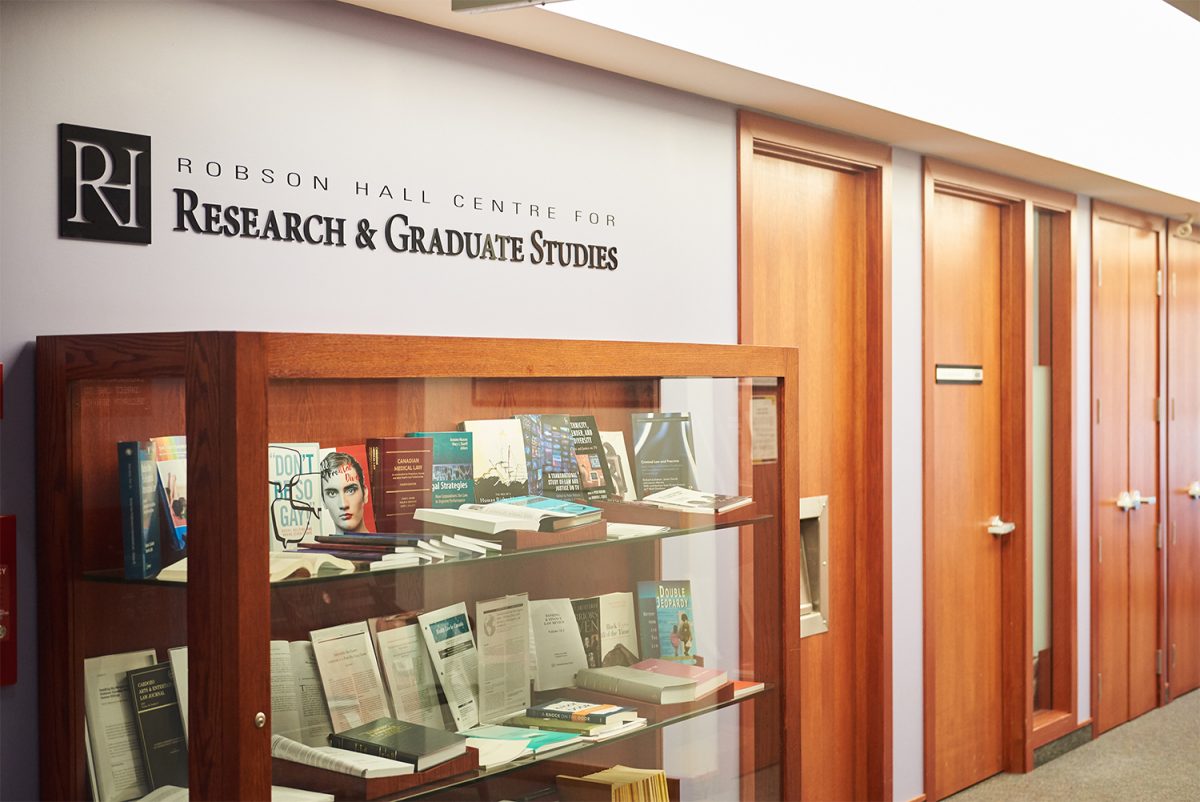
Convocation October 2020: LLM Student Stefanie Goldberg
Guiding the way to resolve conflict
Stefanie Goldberg graduates this fall with a Master’s degree in Law from the University of Manitoba, after her experience with articling and practicing law made her come to appreciate and enjoy legal research and writing. Goldberg, who had first completed a Bachelor of Arts in English Literature at the University of Winnipeg, returned last year to her Juris Doctor alma mater of Robson Hall for its graduate program. “During my year as an LLM student, I was able to spend some time looking into alternative legal career paths while also engaging in further research and writing in an area that I am truly interested in,” Goldberg said.
“I really enjoyed my UM experience,” she said, expressing appreciation for the independent nature of the LLM program and her time working with her advisor, Dr. Jennifer L. Schulz. “Dr. Schulz was one of my favorite professors in law school and was a perfect match as my advisor.”
“Stefanie Goldberg was a pleasure to supervise,” said Schulz, a former Associate Dean of Research and Graduate Studies at the Faculty, and past winner of the Barney Sneiderman Award for Teaching Excellence. “She succeeded in writing a very timely thesis that has the potential to help the province of Manitoba as it goes forward in its processes of family law reform. In particular, Ms. Goldberg’s insights into the benefits of mediation for divorcing couples will serve our province well, and are likely to lead her to develop family-law-related ADR policy in the future. She will have her choice of employment.”
Goldberg is in the process of submitting her thesis for publication, but is set to graduate in the UM’s virtual convocation ceremony taking place October 22, 2020. In the meantime, she shared some insights on her research with Robson Hall:
RH: What was your thesis?
SG: My thesis focuses on The Family Dispute Resolution (Pilot Project) Act of Manitoba (“FDRA”), which creates a three-year pilot project which will mandate the resolution of certain family disputes outside of our courts, through alternative mechanisms like mediation. Under the FDRA, “resolution officers” will be responsible for triaging families into these alternative resources. Currently, the FDRA provides insufficient guidance to resolution officers to enable them to conduct this triaging role effectively. This is problematic as triaging is the first major step in the FDRA process and will set the course for the parties’ entire dispute resolution experience under the new scheme.
Given the importance of this step, and the likelihood that mediation will be one of the primary processes used to resolve disputes under the FDRA, I attempted in my thesis to create enhanced guidelines to help resolution officers match parties to the most optimal type of mediation to fit their particular needs. These guidelines were informed by both the mediation literature and the results of qualitative interviews which I conducted with some of Manitoba’s most knowledgeable family mediators. Considering factors like the nature of the family law issue, the complexity of the case, the level of conflict, and the degree of power imbalance between parties, I attempted to evaluate whether facilitative, evaluative or transformative mediation methods will be the most effective. I also explored the training and qualifications which might best prepare resolution officers to fulfill their triaging functions.
RH: What was your inspiration to pursue that area of research?
SG: I have been interested in mediation and its role in the legal system since I started law school. I was introduced to the practice in my first year while I was attending the University of North Dakota School of Law, where I undertook transformative family mediation training. After that training, I had the opportunity to shadow a family law attorney in her comprehensive family mediation practice here in Winnipeg at Family Conciliation Services. This opened my eyes to another form of family mediation and allowed me to see firsthand how this practice is being used to help resolve legal disputes which are ordinarily dealt with in our court system. Therefore, when I decided to pursue my Master’s degree, I knew that I wanted to somehow focus on this subject in my thesis. It just so happened that Manitoba’s Family Law Modernization efforts and the creation of the FDRA arose at the very same time that I began contemplating what exactly to write about. It was meant to be!
RH: What lies ahead – more academia/teaching or will you practice?
SG: I have just recently started working at the Manitoba Law Reform Commission as legal counsel. I am really excited about this position because it is rooted in legal research and writing which aims to improve, modernize and reform the law and administration of justice in Manitoba. I really feel like I am engaging in meaningful and important work as a lawyer, and I am happy to be utilizing the legal research and writing skills that I honed during my Master’s degree.






